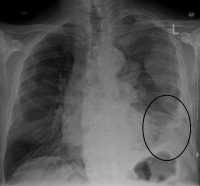
23 Apr Mesothelioma: Prognostic Signature of 48 Genes Identified
MedicalResearch.com Interview with:

Dr. Ulhas Nair
Nishanth Ulhas Nair, Ph.D.
Affiliation: Staff Scientist at Cancer Data Science Laboratory, Center for Cancer Research
National Cancer Institute (NCI), National Institutes of Health (NIH)
Bethesda, Maryland, USA. Date: April 22, 2021
Dr. Raffit Hassan and Dr. Eytan Ruppin at the National Cancer Institute (NCI) are the senior authors of this study.
MedicalResearch.com: What is the background for this study?
Response: Malignant mesothelioma is an aggressive cancer with limited treatment options and poor prognosis. An in-depth knowledge of genetic, transcriptomic and immunogenic events involved in mesothelioma is critical for successful development of prognostics and therapeutic modalities. In this study we aim to address this by exploring a new large scale patient tumor dataset of 122 mesothelioma patients, called NCI mesothelioma patient data, along with their genomic, transcriptomic, and phenotypic information. Unlike previous large-scale studies which have been focused on malignant pleural mesothelioma patients, our dataset contains an approximately equal representation of malignant pleural and peritoneal mesothelioma patients which allows to identify any differences between them.
MedicalResearch.com: What are the main findings?
Response: The important findings from this study include:
a) We identified a set of 48 genes, called “mesothelioma prognostic signature”, whose high expression level is associated with poor survival. These genes are enriched for genes related to cell cycle and DNA repair. This signature is highly predictive of patient survival in two other independent, pleural mesothelioma cohorts: TCGA mesothelioma1 and Bueno et al. mesothelioma2 datasets.
b) Among the 48 genes, the expression of CCNB1 gene is highly predictive of patient survival suggesting its important role in mesothelioma, possibly via its involvement in the CDK1- CCNB1-CCNF complex.
c) We estimate immune abundances in mesothelioma tumors and quantify their differences between patients with high and low mesothelin expression. Increased macrophages M2 abundances is associated with worse mesothelioma patient survival, in our cohort.
d) Using genetic interactions like synthetic lethality, we used a recently published precision oncology based computational framework called SELECT3 , for analyzing the patients’ transcriptomic data to accurately predict response to an anti-PD1 immune checkpoint inhibitor and and combination therapies with pemetrexed (chemotherapy) in mesothelioma patients.
MedicalResearch.com: What should readers take away from your report?
Response: We identify a 48-gene mesothelioma prognostic signature whose expression is highly predictive of patient survival. Some of these genes could be potential drug targets in treating malignant mesothelioma patients. CCNB1, a cell cycle gene, in particular seems to play an important role in mesothelioma. The role of this gene in mesothelioma was previously unknown. We also see that precision oncology framework (SELECT) is predictive of the patient response to anti-PD1 checkpoint inhibitors and for combinations involving the commonly used chemotherapy drug Pemetrexed. We predict that we could have potentially suggested effective therapy for 50% of the patients in our cohort if we had used SELECT.
MedicalResearch.com: What recommendations do you have for future research as a result of this work?
Response: Malignant mesothelioma is a difficult cancer to treat, and patient stratification is extremely important. Given the encouraging results we obtain in stratifying patients to anti-PD1 checkpoint inhibitors and for combinations involving Pemetrexed, prospective clinical trials validating our
precision oncology approach is a very important future step. Also, a prospective clinical trial validating the survival prediction using our mesothelioma prognostic signature would be very useful.
Any disclosures? I do not personally have any disclosures to make.
Citation:
AACR 2021 abstract:
Genomic and transcriptomic profiling of malignant mesothelioma patients identifies gene signatures predictive of survival and response to immuno and chemotherapy
References:
- Hmeljak, J., Sanchez-Vega, F., Hoadley, K. A., Shih, J., Stewart, C., Heiman, D., … & Ladanyi, M. (2018). Integrative molecular characterization of malignant pleural mesothelioma. Cancer discovery, 8(12), 1548-1565
- Bueno, R., Stawiski, E. W., Goldstein, L. D., Durinck, S., De Rienzo, A., Modrusan, Z., … & Seshagiri, S. (2016). Comprehensive genomic analysis of malignant pleural mesothelioma identifies recurrent mutations, gene fusions and splicing alterations. Nature genetics, 48(4), 407.
- Lee, J. S., Nair, N. U., Dinstag, G., Chapman, L., Chung, Y., Wang, K., … & Ruppin, E. (2021). Synthetic lethality-mediated precision oncology via the tumor transcriptome. Cell.
JOIN OUR EMAIL LIST
[mailpoet_form id="5"]We respect your privacy and will never share your details.
[last-modified]
The information on MedicalResearch.com is provided for educational purposes only, and is in no way intended to diagnose, cure, or treat any medical or other condition. Always seek the advice of your physician or other qualified health and ask your doctor any questions you may have regarding a medical condition. In addition to all other limitations and disclaimers in this agreement, service provider and its third party providers disclaim any liability or loss in connection with the content provided on this website. Some links may be sponsored.
Last Updated on July 31, 2024 by Marie Benz MD FAAD
